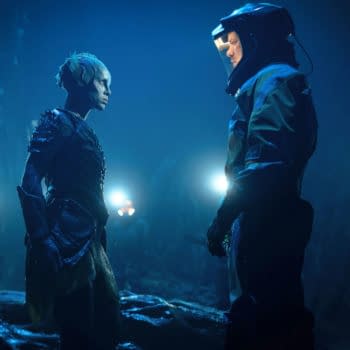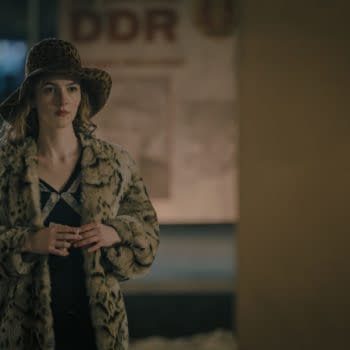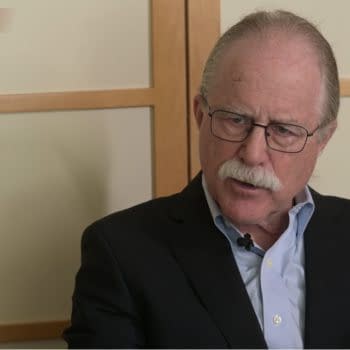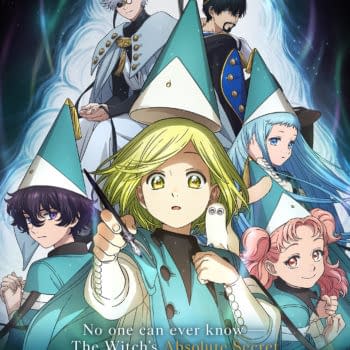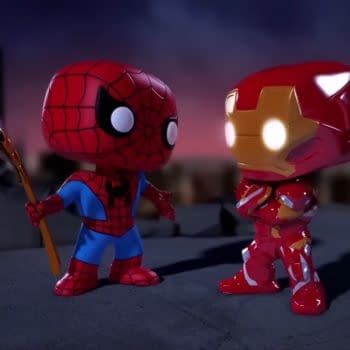Posted in: BBC, Disney+, Opinion, TV, TV | Tagged: ai, doctor who, opinion
Doctor Who: We Had AI "Write" an Episode; The Results Were Telling
We asked an AI to "write" a Doctor Who episode. The result? It depends on what you're looking for - but it's lacking one essential element.
Article Summary
- AI-generated Doctor Who episode explores luxury train stuck between futures on ocean planet Aquilion-5.
- The episode features the Fifteenth Doctor, Ncuti Gatwa, facing a villain with time-rewriting powers.
- AI creates a "classic" Doctor Who plot scenario but lacks emotional depth and character development.
- The AI story mirrors the "old-school" Doctor Who style, but with the focus on plot over modern emotional storytelling.
If there's one thing Doctor Who fans like talking about and debating, it's coming up with their own stories. That's where fanfic comes in, and some of these writers end up becoming professionals. That's how Russell T. Davies, Steven Moffat, Paul Cornell, Chris Chibnall, and many more got their start. The biggest debate now is what makes a good Doctor Who story since some fans argue that the series is no longer what it used to be, that the style of the stories has changed, and they like to argue what makes a good Doctor Who story. We decided as an experiment to put that to the test by getting an AI to write an episode of the show. We fired up ChatGPT and did just that. Anyone can do that with any known TV show. We didn't give it any special instructions; we merely asked it to think like a British TV writer and come up with an episode plot outline for the show. The results are below.
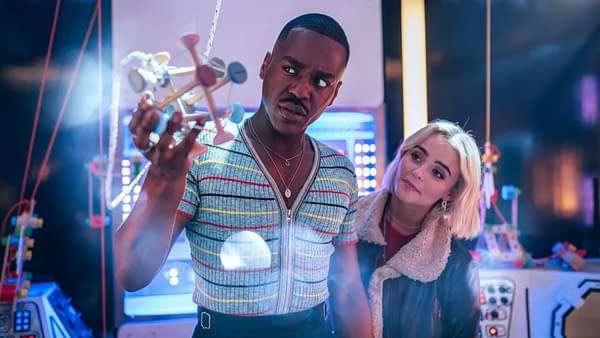
DOCTOR WHO: "The Glass Horizon"
Doctor: Fifteenth Doctor (Ncuti Gatwa)
Companion: Ruby Sunday
Cold Open:
A luxury hyper-train glides across the surface of a distant ocean planet, Aquilion-5. The passengers—wealthy elites, celebrities, and powerful figures—sip cocktails in glass-domed carriages, watching the endless water stretch to the horizon. Suddenly, the train jerks to a stop. The windows begin to liquefy. A shadowy figure in an old-fashioned conductor's uniform walks through the glass as if it were air. The passengers scream. Smash cut to titles.
ACT ONE:
The TARDIS materializes in the engine room of the train. The Doctor and Ruby step out, instantly feeling the wrongness—the air is thick, shimmering. The Doctor licks his finger, sniffs. "Oh-ho! That's not air. That's time behaving badly."
They meet Commander Vaylen, the no-nonsense security officer, who assumes they're stowaways. Before she can arrest them, a passenger phases halfway through a wall, screaming before vanishing completely. The Doctor sonics the residue. "Temporal degradation. Oh, that's very not good."
ACT TWO:
Investigating, they discover a hidden, off-limits carriage—a time capsule built into the train, containing The Horizon Engine, an experimental device designed to glimpse possible futures. The train is powered by stolen fragments of time itself, harvested from collapsed stars. The Doctor is furious. "You don't steal time. You borrow it. And time always collects."
Then the Conductor appears—The Glassman, a spectral entity made of transparent, shifting glass. It speaks in echoes, whispering half-formed futures. "The train goes nowhere. The end is already written." The Doctor realizes: the Glassman isn't an enemy. It's a warning. The train isn't heading to its destination—it's stuck between two possible futures, doomed to collapse into nonexistence.
ACT THREE:
The Glassman reveals the truth: someone on board sabotaged the engine, trying to manipulate time to rewrite their future. Suspicion falls on Dr. Hexton, a scientist whose homeworld was wiped out in a war. But when Ruby and Vaylen check the logs, they realize—it wasn't him. It was the train's billionaire owner, Lorrien Cass, who wanted to see her future… and rewrite it to avoid her own death.
The Doctor confronts Cass, who is now merging with the timelines, flickering between different versions of herself. "You've tangled the weave, Cass. Time doesn't like cheaters." The train starts unraveling—glass shatters, carriages distort, passengers phase in and out of reality.
ACT FOUR:
The only way to stabilize time is to reverse the Horizon Engine—but it requires a massive energy source. The Doctor, grinning, pulls out a Time Lord pocket watch (a remnant from a previous self) and smashes it into the engine. "A little bit of me, a lot of hope."
With a surge of golden light, the train is anchored back to reality. The Glassman shatters into a thousand possibilities, disappearing into the ether. The Doctor warns Cass: "You can't outrun time. It always wins." Cass, shaken, agrees to shut the project down.
As the TARDIS dematerializes, Ruby asks: "Do you think the Glassman was really a monster?" The Doctor, pensive: "Maybe not. Maybe it was just time… looking at itself in the mirror."
Roll credits.
"This episode would have a high-concept sci-fi mystery with weird time anomalies, a classic moral dilemma, and a creepy, poetic villain. Would you watch this? 👀"
A Review of Doctor Who: "The Glass Horizon"
AIs aren't so much real Artificial Intelligence but more Large Language Models and advanced search engines. They don't think. They take a prompt or request and search the internet to compile what you ask them to create. Everything on the internet is there for an AI to find and learn from,t he put together in a coherent way. ChatGPT has already been able to read everything written about Doctor Who available on the internet and learned to put a story together. The resulting episode story, "The Glass Horizon," is formatted just like a professional TV outline would be presented in production offices and writer's rooms.
ChatGPT did something quite impressive: it knew that Doctor Who is currently Ncuti Gatwa and the most recent companion was Millie Gibson. It understood how many acts and how a single 44-minute episode is paced. it came up with a surprisingly original high-concept monster and Science Fiction and Time Travel setting for the show. It came up with a perfectly decent generic Doctor Who plot and even a bit of poetic reflection about the theme behind its monster. All in all, it's a good attempt at a typical Old School Doctor Who plot, with the emphasis on plot more than character or emotion. It could be a story for any Doctor or any companion, a placeholder, if you will.
That said, "The Glass Horizon" lacks the emotion, character development, and key elements of the story that make it personal for the Doctor or the companion that's a major part of modern Doctor Who. The emphasis on plot over character is from the classic era of the show and all sixties, seventies, and eighties TV series. Would this story be sellable to today's Doctor Who? That's a good question. An AI might be clever enough to stitch together a generic plot for any TV show by studying how it's usually written, but this test shows that AI still can't write genuine or authentic emotional stories.
Doctor Who is streaming outside the UK on Disney+.





